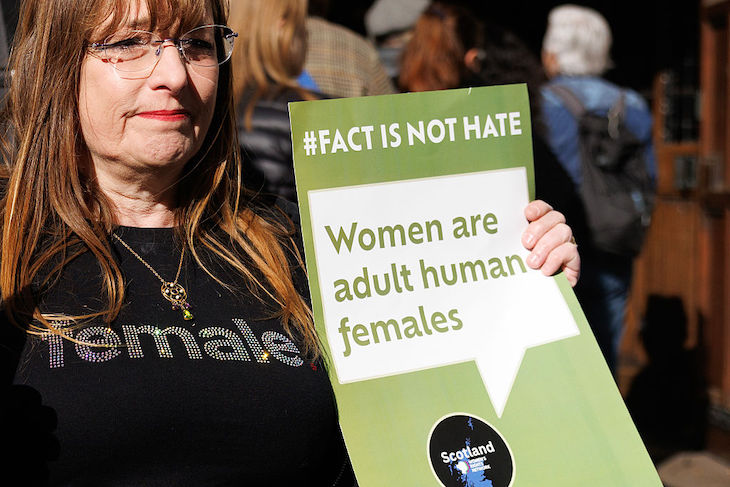The inquisition that has been launched by woke physicists against a physics professor for expressing some heretical ideas at the Conseil Européen pour la Recherche Nucléaire, or Cern, about why women are under-represented in the field is truly shocking. You would think physicists, of all people, would be wary of inquisitions.
Following his presentation, Professor Strumia has now been suspended by Cern, where he’s regularly employed, and is under investigation by the University of Pisa, where he holds a chair in physics, for ethics violations. I wouldn’t be surprised if he loses both positions.
In the BBC report, his headline sin is reported to be claiming that ‘physics was invented and built by men’. That’s not 100 per cent accurate — some women, such as Marie Curie, have made critical contributions to the field — but is it ‘offensive’, as some feminists have claimed?
The reason his presentation caused an uproar is that he challenged the orthodox view that the reason women are under-represented in physics is because of implicit bias, stereotype threat and sexual discrimination. Professor Strumia, whose presentation you can see here, pointed out that female applicants for post-doc jobs in physics aren’t discriminated against; they’re actually more likely to get hired than male applicants with the same credentials. Admittedly, he is judging their credentials according to how many citations their academic papers have by other scholars and some of his critics have questioned that metric. However, to the best of my knowledge, they haven’t proposed any counter-evidence which shows that, in fact, female applicants are being discriminated against.
Feminists will say it’s harder for women to reach the post-doc level than men, but Professor Strumia pointed out that isn’t true either, at least not when it comes to securing places to study physics at university. Many university physics departments discriminate in favour of female applicants.
What about in school? Surely, women are discouraged from studying physics at school, whether explicitly or by unconsciously biased schoolteachers? Well, no, there isn’t much evidence of that either, not in the West, not any more. Indeed, the evidence that human behaviour is critically affected by unconscious or implicit bias is threadbare at best. See here for a comprehensive rebuttal.
One feminist physicist suggested that Professor Strumia should be given ‘unconscious bias training’. (In a camp of some kind? She didn’t say.) But the evidence that such training has any impact at all is, again, flimsy. On the contrary, one study suggested that people who’ve been taught to check their privilege with respect to unconscious racial bias are more likely to discriminate afterwards, not less.
So could it be – hush now, don’t say it out loud — that the reason more highly-intelligent women don’t study physics, particularly at a post-graduate level, is because — in general, not in every case, obviously — they just aren’t as interested in it as in other subjects? Could it be that, at a population level, women are more interested in people – more empathetic – and men are more interested in things – more systematic? There’s not only evidence for that gender difference across time, but also across species – and this difference is detectable in newborn babies, as Professor Simon Baron-Cohen’s work has shown.
One compelling piece of evidence that the under-representation of women in physics is due to a lack of interest in the field among women in general, rather than ‘systematic oppression’, is that the more gender equality there is in a country, the lower the female participation in STEM is. Professor Strumia appealed to this fact in his presentation and there’s a good summary of all the evidence on this here.
It is hard not to conclude that the reason there are fewer women physicists is not because of implicit bias, stereotype threat or discrimination, but because when highly-intelligent women exercise their free will — yes, they can do that — they choose the subjects that interest them most. Like healthcare, for instance. 82 per cent of obstetrics and gynaecology medical residents in the US in 2016 were female — although, weirdly, stats like that haven’t prompted anyone to inquire about whether there’s any sexual discrimination against men in healthcare.
I don’t doubt some physicists will take issue with this post, just as they’ve taken issue with Professor Strumia’s presentation — not least because the hard sciences are in the process of being captured by the identitarian Left, as Heather Mac Donald, author of The Diversity Delusion, points out in this essay for City Journal.
But in heaven’s name, why not just debate these issues? If feminist physicists think Professor Strumia’s analysis is scientifically unsound, pick holes in his argument. Present the counter evidence. Show that he’s indulging in bad science. That’s the scientific approach, surely? But no. Instead, it’s just wild speculation about his motives – he was overlooked for a job in favour of a women, therefore he’s an embittered misogynist. A dismissal of his ideas as ‘dangerous’ because they make female physicists feel bad. Or the absurd claim that it’s ideas like his that will put off bright young women from applying to do physics at university rather than, I don’t know, feminists saying that women in physics will face an unending barrage of sexual discrimination and harassment.
What’s really depressing is that much of the media is reporting this through an identitarian lens, distorting what Professor Strumia said and regurgitating the SJW critique, as if he’s part of the dark forces of oppression and the woke physicists are brave freedom fighters – freedom fighters who are now using their collective institutional and cultural power to make sure this lone heretic is expelled from the scientific temple and deprived of his livelihood.
If the battle between Galileo and the Pope was refought today, it looks very much like Strumia’s scientific critics would be on the side of the Pope. I wonder how they square that with their belief in the scientific method? And for all those calling for Professor Strumia to be fired, I will leave you with this thought: if you demand that someone who challenges the prevailing orthodoxy should be punished, I don’t see how you can expect to go unpunished if you ever challenge that orthodoxy.
This article was originally published on The Spectator’s UK website.

























